Items
Tag is exactly
tourist
-
2022-03-11
Post Covid, Yay Hawaii!
When the COVID-19 travel restrictions were lifted, our family immediately headed for Aulani, A Hawaii Disney Resort – this was already planned as a Christmas gift (‘21) for Spring Break (‘22). In fact, upon arriving, we found out that the lockdown for the island was going to be lifted the very next day. So masks and other PPE were not necessary when moving about the exterior hotel. In fact, events around Oahu (Polynesian Cultural Center) were also relaxing C-19 measures for tourists and all guests. Small precautions were still in place, like one family in the elevators at a time, no character meet and greets (with full contact), and masking indoors. Due to Hawaii being landlocked, the importance of C-19 measures meant we all had to do our part to stay covid free. We were happy to do whatever it took. Our memories of this trip were refreshing. It was nice to get out of the house and to the islands (not the desert where we are from), experience and learn the culture of Hawaii, take in a little dose of Disney, and be mask-free, even with precautions being taken in some areas (which we were okay with). -
2023-10-12
No Longer a Traveler
The pandemic has altered the way I view and interact with people and places. Although I have always been cautious of germs, illness, personal space, and keeping healthy, the pandemic has heightened my awareness. I am now turned off and disgusted by the thought of crowed spaces, movie theaters, gyms, airports and other places with heavy traffic. I no longer have interest in activities I once enjoyed and participated in. This has affected how I travel and how often. I once loved traveling, visiting new places, trying new restaurants, interacting with communities, and just being a “tourist”. After the pandemic restrictions were lifted, I had no interest in traveling and enjoyed being at home. Home was comfortable and safe. The first time I traveled after the pandemic was in 2022, I traveled to California to attend a conference, visit some museums and to do touristy things. I did enjoy my experiences, but it was truly exhausting. I was constantly worried that I had caught COVID or that I was going to catch it. By the end of the week, I was ready to go home and recover from the anxiety I had. It has been a year since that trip. -
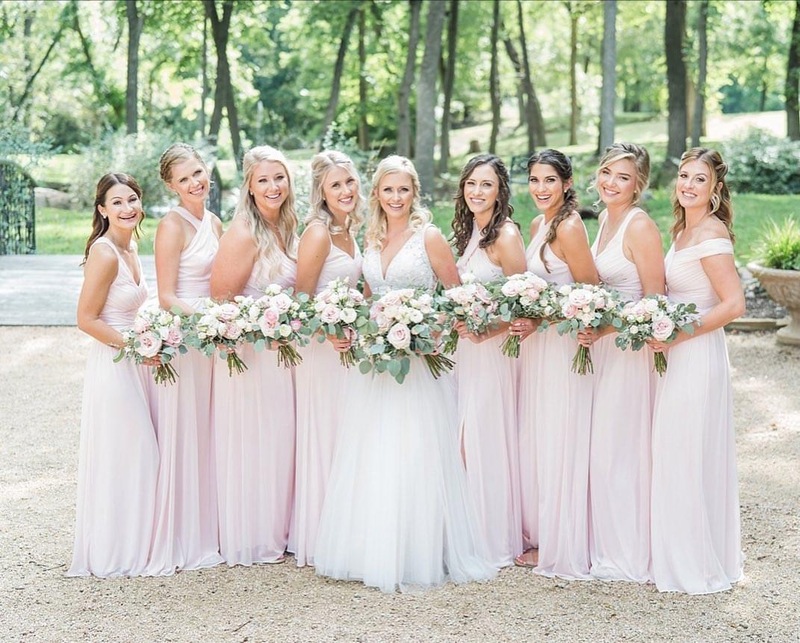 2020-10-03
2020-10-03With Love
When travel restrictions were lifted, did you take a trip? -
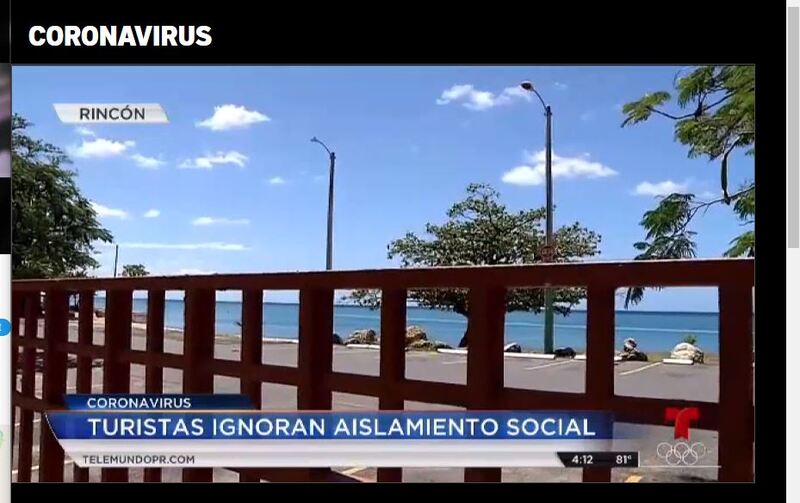 2021-10-05
2021-10-05Turistas Ignoran Aislamiento Social en Rincon PR
Maria del Carmen Gonzalez de Telemundo PR entrevista al alcalde de Rincón, Carlos López Bonilla. El alcalde dice que los turistas están ignorando las reglas de distancia social y los toques de queda. Maria del Carmen Gonzalez: "Nostotros con se encuentra el alcalde de rincón, Carlos López, a quien le agradecemos que esté aquí con nosotros durante la tarde de hoy. Como el municipio a manera de las situactión para controlar a los turistas a tenido a problema con el." Carlos Lopez Bonilla: "Sí, ese es situactión un mucho problema. Cuando comenzó todo esto, el toque de queda, por lo menos tuvimos que nosotros a intervenir con más de 100 ahorita en las diferentes calles, las diferentes playas, extraído poco a poco. En el segundo día fueron menos y hay hoy en el día de hoy ya ha sido 88 personas que nosotros tenemos que ir con otro. Personal a intervenir con ellos y hablar con ella." -
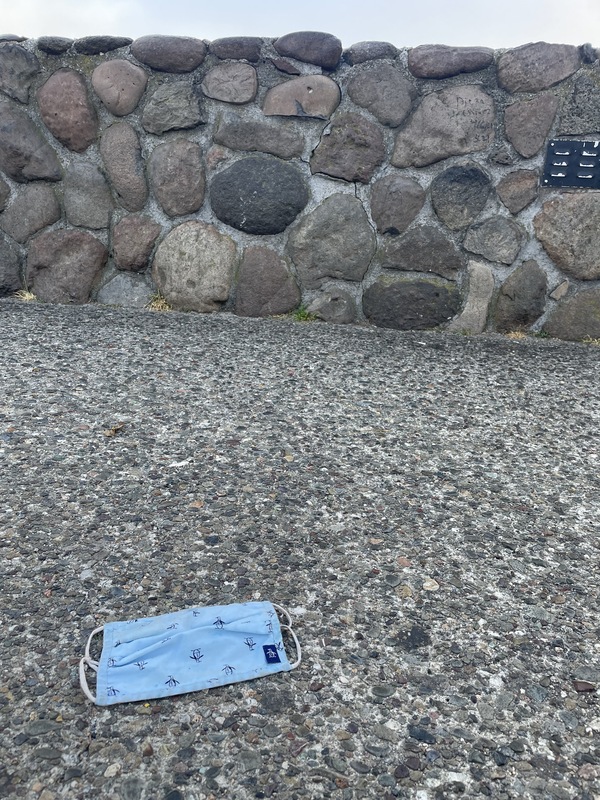 2021-06-12
2021-06-12Mask trash San Francisco
While visiting the Golden State Bridge, I came across this blue fabric mask with a penguin print. -
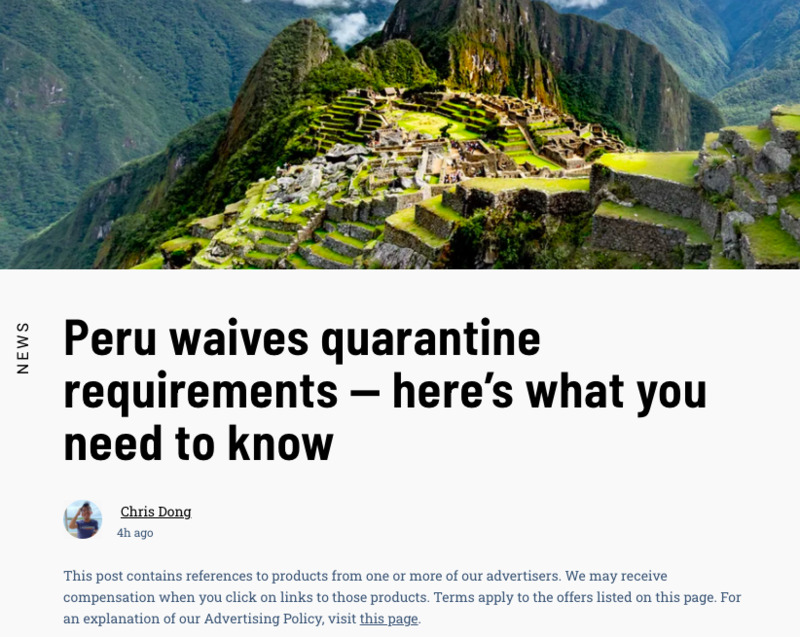 2021-03-18
2021-03-18Peru waves quarantine restrictions
Peru, which continues to suffer from high COVID-19 transmission rates, has lifted quarantine restrictions for international travelers. The Peruvian economy has been undermined by a loss of tourism, its affected restaurants, hotels, guides, transportation, and other facets that depend on foreign capital. The only catch is that you have to have a negative COVID-19 test 72 hours prior to arrival. All of this hints at the importance of money and influence after all-it's mostly wealthier travelers who would have the money to travel for leisure and access to COVID testing. But...what about everyone else on the plane? -
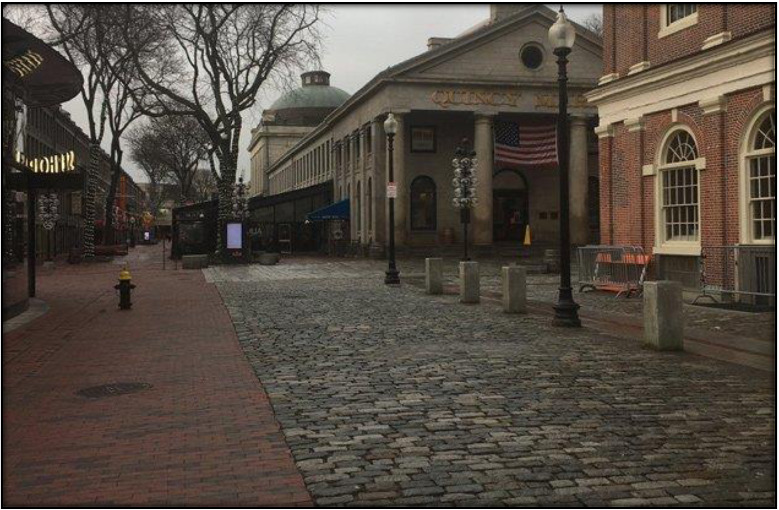 2020-11-04
2020-11-04Ghost Town
This is a picture of one of the most popular and bustling tourist spots in Boston. Here is a picture of it during Covid-19 pandemic. A once busy street packed full of residents and tourists going to get food at the many restaurants inside Quincy Market and people walking along the Freedom Trail packed this destination full of people. The sea of people that one would see here is a huge contrast to what is seen now, which is an almost eerie image of the empty plaza. Once this year is over and this virus is gone, this historic plaza will return to its former glory. -
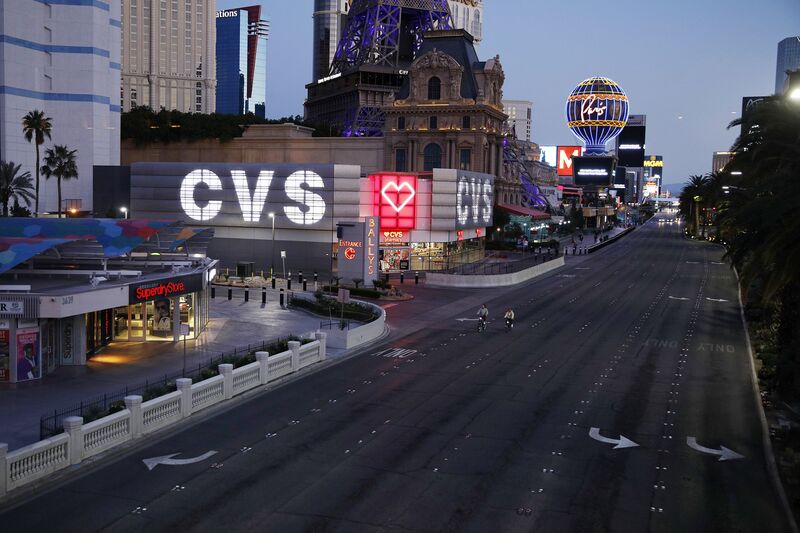 2020-11-07
2020-11-07Coronavirus in Las Vegas
Covid-19 has affected everyone in the world, and the city of Las Vegas is not an exception. Las Vegas is considered to be a major tourism spot yet no one is here. Coronavirus did not just impact tourists, but locals as well. Seeing our city empty and looking like a ghost town is sad and it feels like our sparkle is gone. Although they are being empty because it is for our good to remain distant from others during these harsh times, it is still terrible to see our city empty and eerie. When we think of Las Vegas we think about the huge crowds at the strip, the casinos filled with people gambling or watching shows. Now the city that never sleeps is now an empty place that does not look like the city we know and love. Fichtel, C. (2020, April 22). Las Vegas workers push back after mayor's call to reopen casinos and hotels. Retrieved November 07, 2020, from https://news.yahoo.com/las-vegas-workers-push-back-022132572.html?guccounter=1 -
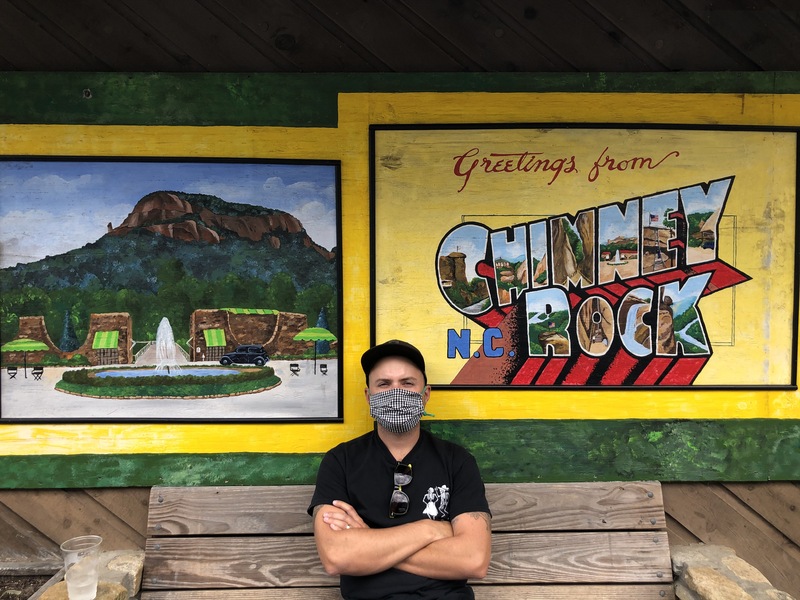 2020-10-01
2020-10-01Roadtrip
This is a picture of my husband from our trip to Chimney Rock, North Carolina. We had not left our city of Charleston for months due to Covid, but decided to take a small trip for my 30th birthday. The entire time we were playing tourist, we wore our masks and did our best to social distance. In the area we stayed, there were signs everywhere that explicitly said, "You must wear your mask" or "Masks are required". However, many people chose not to wear them or had them on incorrectly. It was a little odd being around so many people during this time, but we made the best of it. -
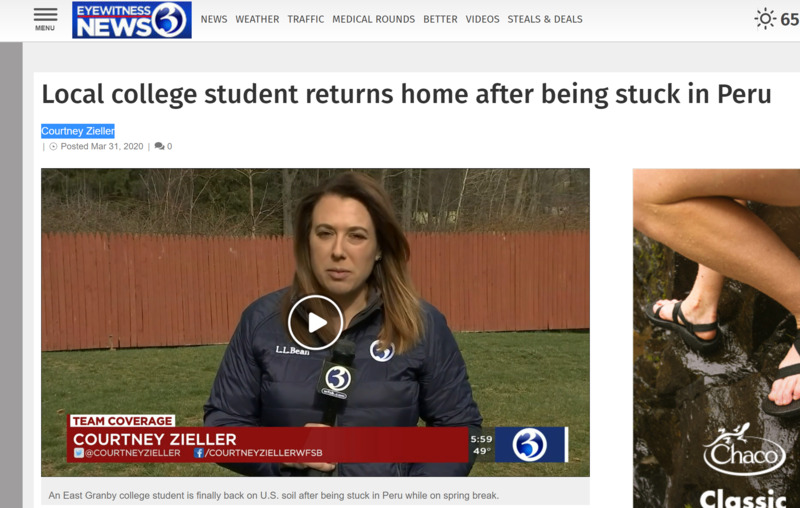 2020-03-06
2020-03-06The Peruvian Experience
So I am down in Peru with three fellow students from Wesleyan University. We are just beginning our spring break, and had recently united in Lima before flying together to Cusco the next morning. Our plan was ambitious, chaotic, and irresponsible in hindsight; we had decided to hike the Salkantay Trek from Soraypampa to Aguas Calientes. The evening of our arrival, we were out to dinner when at 9 pm, my friend receives an alarming text from his mother stating that the Salkantay Trek was closed because of a historic mudslide that had decimated the entire trail below the highest pass. This slide sent at least 12 to their death (many remain missing today) while simultaneously displacing 430 families living in the valley. At the time, we were unaware of these disturbing statistics and decided to find a tourist agency that would perhaps guide us part of the way. At 10 pm that evening, we located a random tourist shop that was lightly populated by two employees in the backroom of a jumbled building of interior storefronts. They assured us that not only is the trek impassible at multiple points, but that the Peruvian government was preventing travelers from setting out on the trail. We offered to pay a guide to take us even part of the way, but they turned our proposal down. They did, however, secure us seats on a bus leaving at 5 am the next morning to Soraypampa where tourists engrossed themselves in a heavily assisted day-hike to Lake Humantay. We waiting in the darkness of the Plaza de Armas while bus after bus went to various other locations around Cusco. We dizzily wavered around due to the 11,000 feet of altitude gain that we had assumed less than 24 hours ago until a bus finally came to pick us up. From there, we dangerously (or so we thought at the time) drove through one-lane mountain roads in a loaded bus for nearly five hours. At last, we unloaded and grabbed our packs. We were the only backpackers in sight, and we planned on doing this trek without guidance both geographically and physically. As the rest of the hikers walked packless with sticks to the lake, we lagged behind, destroyed by the sudden difficulty of what was supposed to be an easy first day of trekking. Even with mouths full of coca leaves, two of us required sips of the small oxygen canister we picked up the day before. Our bodies pulsed with symptoms of altitude sickness, but we pressed on. No other view could have made me smile as widely as that of glacial Lake Humantay as we crested the final ascent. At 14,500 feet of altitude, we laughed at the fantastic beauty before us. We had arrived in the early afternoon, and found ourselves almost totally alone beside this pool in the Andes Mountains. Our descent was horrible. Pulsing again were headaches, fatigue, shortness of breath, and swelled joints. In our divergence from the path most traveled, we entered a trail of horse, cow, and llama (domesticated guanaco as we kept on) crap; an uncomfortable rain began to fall, and we found ourselves walking through a mountain feed mist. Within all of our heads was the terrible thought of setting up camp in the rain. Our level of exhaustion was overly evident to any onlooker (there was no one), but as the rain let up and our camp became established, moods lifted and excitement spiked. We were observing the most beautiful sunset display any of us had ever seen. The sun, setting at around 4:00 pm because of the extreme prominence of the surrounding mountains, swirled its orange and pink on the snow-covered top of Mount Salkantay almost as a kind of sorbet is presented at an ice-cream shop. Our wide smiles disappeared as a frigid wind whipped through the valley that we were so exposedly staying in. Dinner in the dark was followed by an unmatched view of eye-contracting stars as we retreated to the chilled interior of our tents. Altitude sickness plagued any chance of a good night's sleep, and we awoke frozen and in a misty cloud. It was this day that we would trek through the Salkantay Pass at 15,220 feet of altitude. Endless switchbacks defined the first half of the day. We toiled over each step, our packs dragging each attempt to press on. After a few hours of extreme exertion and chill, we passed through the highest point of the trek. Once the clouds parted, an incredible view of the mudslide's decimation shocked us into the reality of our unguided trek. The slide refigured the landscape with a melting expanse of boulders climbing both sides of the valley and completely filling in the previous location of the Salkantay Lake. Armed with a compass and an enthusiastic "we can't turn back now" mindset, our trek took us through a few miles of trailless movement into the valley ahead. The rest of this day wasn't by any means forgiving. Passing through a newly abandoned town, over a sea of boudlers and deep, wet sand, and into the jungle valley brought set after set of challenges. Towards hour 11 of the day's hiking, a thunderstorm burdened the final steps we had to take. The valley was steep, and beneath us crept a barren section of forest where the river washed away all vegetation in existence (it rose over 130 feet in some sections). Once we had almost made it to the supposed location of the next town, we hopped another small waterfall and rounded another unpromising corner to see only a gap. For about the length of a track, a secondary mudslide caused by the huge forest laceration made by the river's rise opened up to an impassible section of an unstable dirt cliff-face. We spent the next hour cautiously pressing up and around the empty gap in the forest in the ongoing rain. From there, we very quickly arrived in the next town, populated but in a state of emergency. Their supply of food had been entirely cut off, and reserves were running dangerously low. The following day, we were shown to a couple of provisional bridges that the locals had erected just two days before with some fallen logs and sticks. More treacherous than anything any of us had done, we inched along the sloped, wet logs that stretched over the intersection of two overflowing rivers. Later that day, a mile long mudslide had taken out another part of the trail, but this one was dry and had experienced some local foot traffic (there were no roads for the first four days of trekking). We got ahead that evening, and camped on a man's land high in the valley steeps who informed us that we had been the only group to travel the Salkantay Trek route for the entirety of the year 2020 (this was in March mind you). The next day of trekking was far longer than we had expected, but traveling alone through an ancient village to a phenomenal viewpoint of Machu Picchu made it worth it. We ended in with a beat arrival in Aguas Calientes, but that evening was full of celebration and restaurant food. Two of us woke up with food poisoning, and we decided to travel back to Cusco midday rather than in the evening. Upon arriving at our hostel, President Vizcarra came on the television to announce that Peru would close its airports in 24 hours. At the time of our departure in Soraypampa, the coronavirus had only spread widely in China and Italy, but when we got out, the internet flooded our phones with the reality of online classes, the spread of the virus into a pandemic, and the global closing of boarders. Panic-ridden, we awoke at 5 am to escape the claim that hostels and hotels would be locked from the outside by the police to force a 15-day quarantine period set by the Peruvian Government. We waited outside in the rain until the last flight to Lima departed with us onboard (our ticket had coincided with the last day of open airports by sheer luck). In Lima, we were locked in our friend's house, prevented from going outside by the fear of getting arrested by the endless number of police and military stationed on the streets of the city. Day after day passed, we played chess, meditated, and hoped for an email from the U.S. Embassy of Peru. Weeks passed, and the panic of my family was calmed by my less-bothered conscience. After daily reminders pointing towards the extension of our visit to Peru to months, the housing situation ended for two of us, and we ventured to a nearby hotel to wait out the rest of our stay in Lima. By some miracle, we were then put in touch with a DEA agent helping at the embassy (the DEA helped out because the chair of the embassy and many of his employees all fled back to the U.S. leaving thousands of citizens stranded for much longer). The person who aided us brought us to the embassy to get on a departing repatriation flight as standby passengers. In a rare moment of animation, my friend and I flew on an unfilled flight directly to Washington, D.C. Our trip had ended, but our quarantine in a very strange new world had just begun. I want to note that I skipped large swaths of experience to fit this shortened story into a mildly digestable piece. I also did not read through it yet so forgive any mistakes or sections lacking flow. -
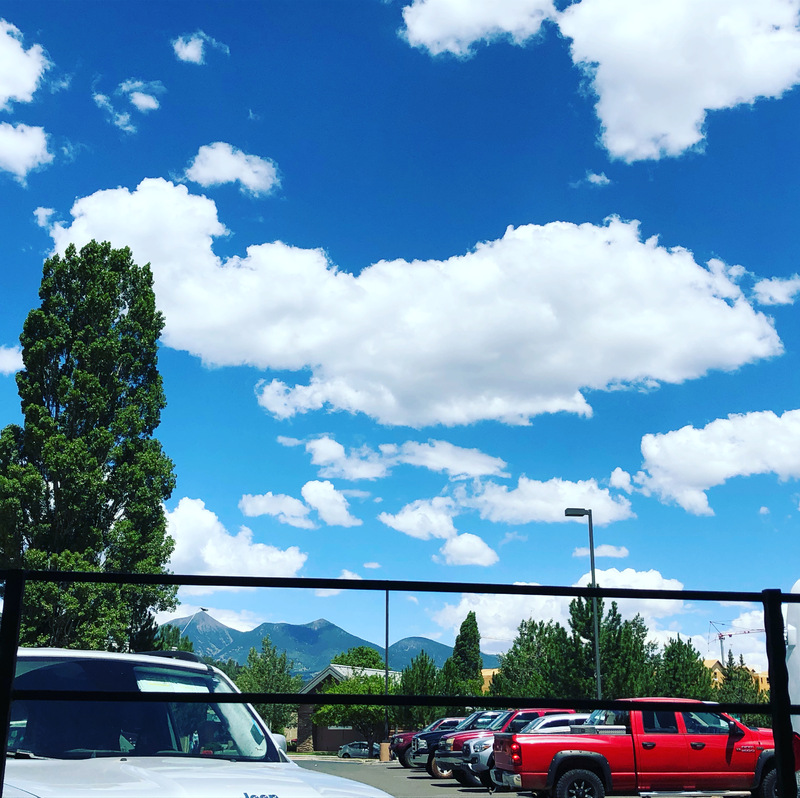 2020-08-08
2020-08-08Day Trip to Wupatki National Monument / Sunset Crater
After being cooped up basically all summer, trying to maintain social distance from everyone due to the pandemic, I decided that I needed to get out and get some fresh air. My cousin had never been to Flagstaff so I decided to go on a day trip with her to Flagstaff and Wupatki / Sunset Crater to get outdoors and get some fresh air and do some sightseeing. We spent the day being tourists and seeing some beautiful scenery. Even though the pandemic is still going strong, this was a safe, socially distanced adventure that we both thoroughly enjoyed. -
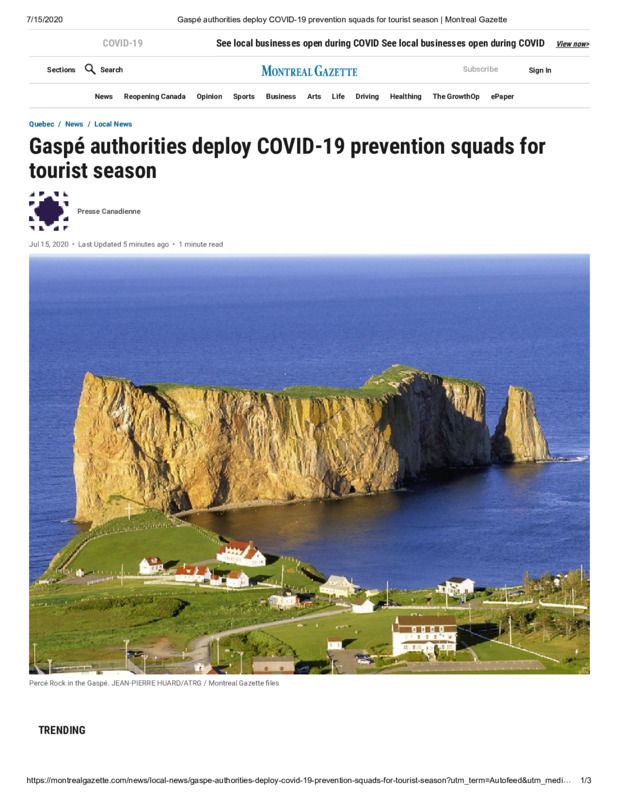 2020-07-15
2020-07-15Gaspé authorities deploy COVID-19 prevention squads for tourist season
"Gaspé’s regional health authority says the squads have received the close collaboration of municipalities that are local tourist attractions. The 10-member squads will be on duty from noon to 8 p.m. daily until the middle of August. The distribution of masks will also take place." -
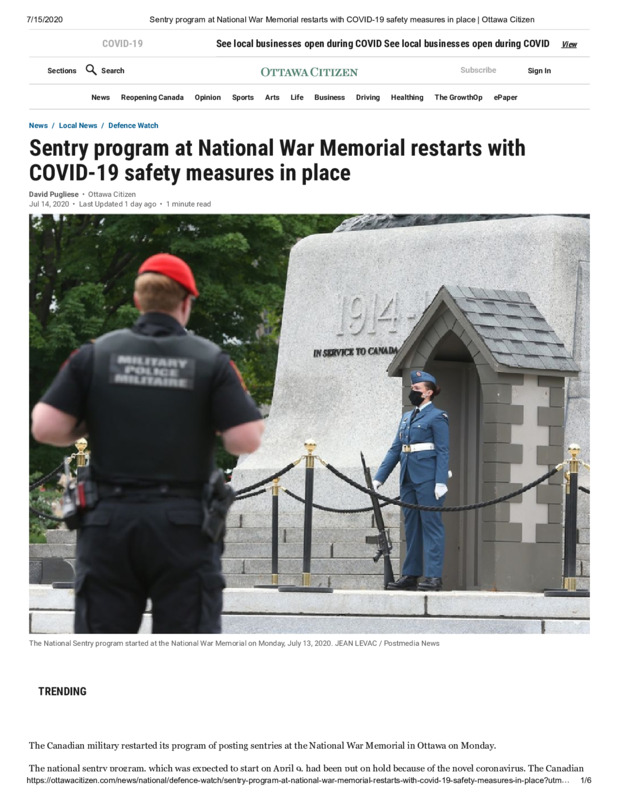 2020-07-13
2020-07-13Sentry program at National War Memorial restarts with COVID-19 safety measures in place
"To limit any possible spread of COVID-19, members of the national sentry program will follow protective health measures of the government and the Canadian Forces. Visitors are asked to keep a minimum two-metre distance from the sentries at all times, the military noted in its statement." An article relaying that the sentries at the National War Memorial will be in place again. They normally stand guard every summer but have not so far this year due to the pandemic. The Canadian Armed Forces have had particularly strict regulations in place for the members since March, in an attempt to ensure should military personnel be needed to respond to a crisis, health or otherwise, there will be sufficient healthy staff available to do so. The presence of sentries at the memorial, which is also the site of the tomb of the unknown soldier, is not particularly representative of the city or military for most Ottawans or visitors but has taken on added significance since a lone gunman shot and killed one of the sentries, from behind, before storming the parliament buildings, several years ago. The sentry was the only victim to die in that attack and his death on duty has given an even deeper value in the post to those who hold it. -
 2020-06-16
2020-06-16Situation of COVID-19 in Bhutan
This story describes Bhutan's success in controlling and preventing the disease from spreading in the communities under the dynamic leadership of His Majesty the King. His Majesty's genuine concern and care for his subjects has gained the attentions and admiration of many in and around the globe standing as epitome to the rest of the leaders. This kind of success under the noble leadership of His Majesty the King despite limited resources and capacity needs to be heard and seen by other world leaders and economically sound countries as it teaches the importance of good leadership over wealth and power. -
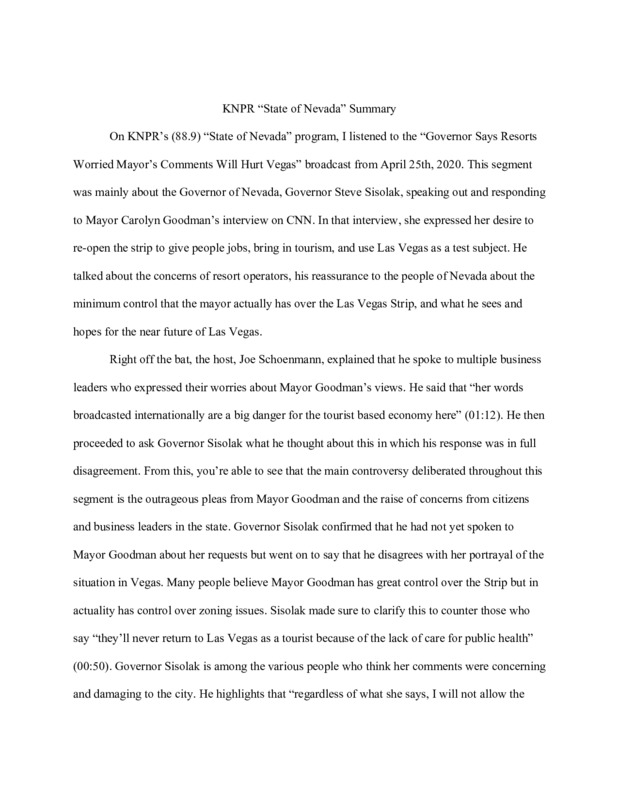 05/03/2020
05/03/2020Governor Sisolak's response to Mayor Goodman's CNN interview
A summary on Governor Sisolak's response to Mayor Goodman's CNN interview #unlv #psc100 #mlphelps -
2020-05-13
Life during quarantine in the Coachella Valley
Our city is known as the City of Festivals; we host several festivals throughout the year. Two of the largest festivals, Coachella and Stagecoach, have been cancelled due to the COVID-19 pandemic. This means a great deal of money and jobs have been lost. Here in the Coachella Valley, we are considered a tourist region, so when tourists can't come or events are cancelled, it is devastating. I was supposed to work at both festivals to help subsidize income for my family. Now, that has been made unavailable. And I am left looking for other ways to bring necessary funds into my household. Not having the festivals and several other events at our many Casinos has been really disparaging. We also have hundreds of Golf courses and resorts. This has put a lot of our people out of work. This also brings a damper to all of the other resources that help make these festivals and events complete. All of the maintenance, food vendors, and other vendors have also lost out of money. I actually work at a Boys and Girls Club and we have been shut down since March 16th. Although, I am still getting paid, it has not been as much as it normally would and that has hurt our family. We have four clubhouses here in the Coachella Valley with thousands of students; having to see these kids not being able to get together and play and have a place to escape for a while has been difficult. We have implemented virtual clubhouse programs to help keep the community connected. Although, that has been made difficult because several of our more eastern cities are more rural. These cities do not have great internet service. Therefore, several students cannot access activities and/or even participate in distance-learning. It is really sad to see how some of our students have not been able to get the help they need. -
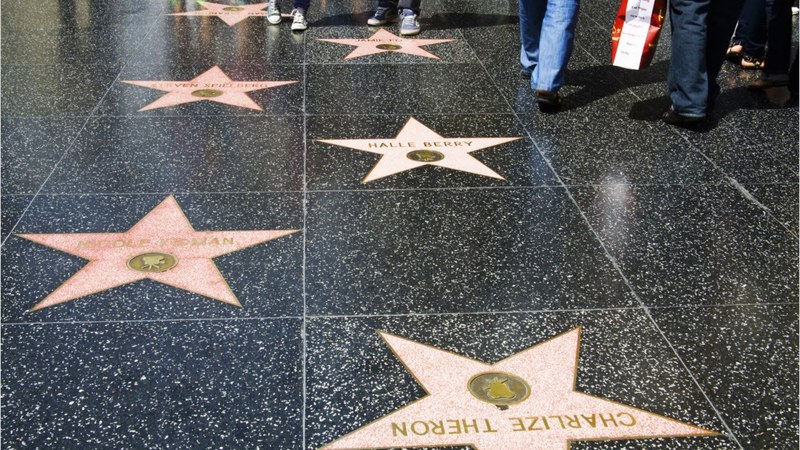 2020-03-18
2020-03-18Hollywood Walk Of Fame
During March, my collogues and I went to California for spring break. At that time, COV-19 was on the rise, knowing this, I was expecting to see less people when we visited Hollywood walk of fame. But it was quite the opposite. It looked pretty normal, showing that not many people take the corona virus seriously. -
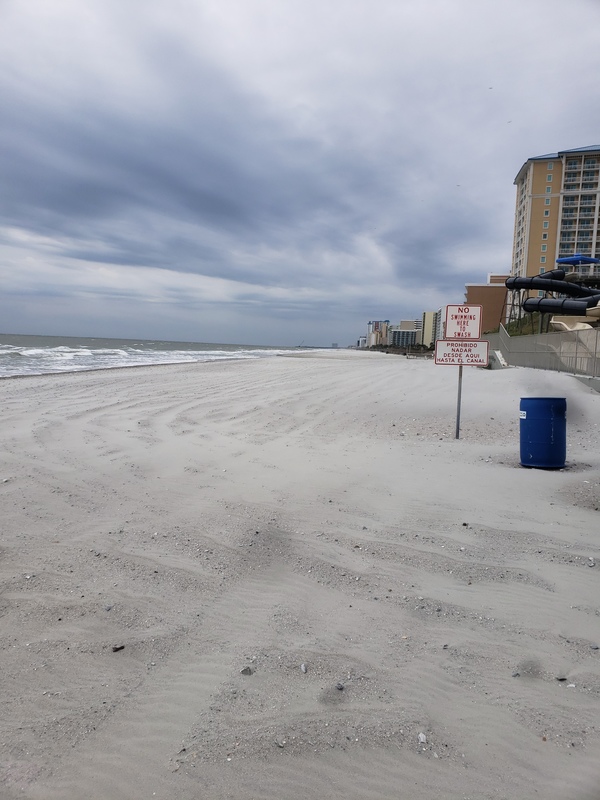 2020-04-01
2020-04-01The Beach today
My photos yesterday while walking
